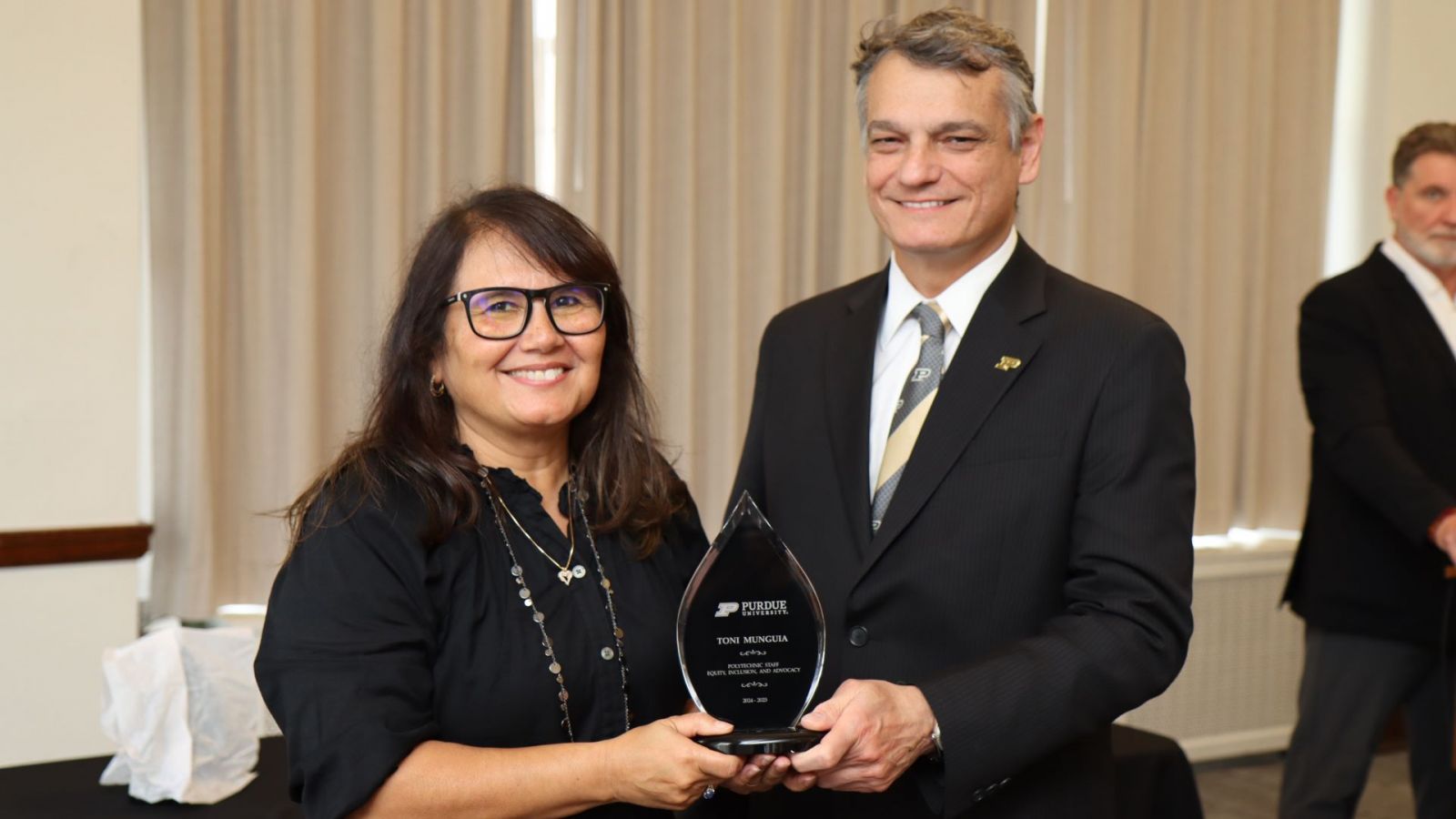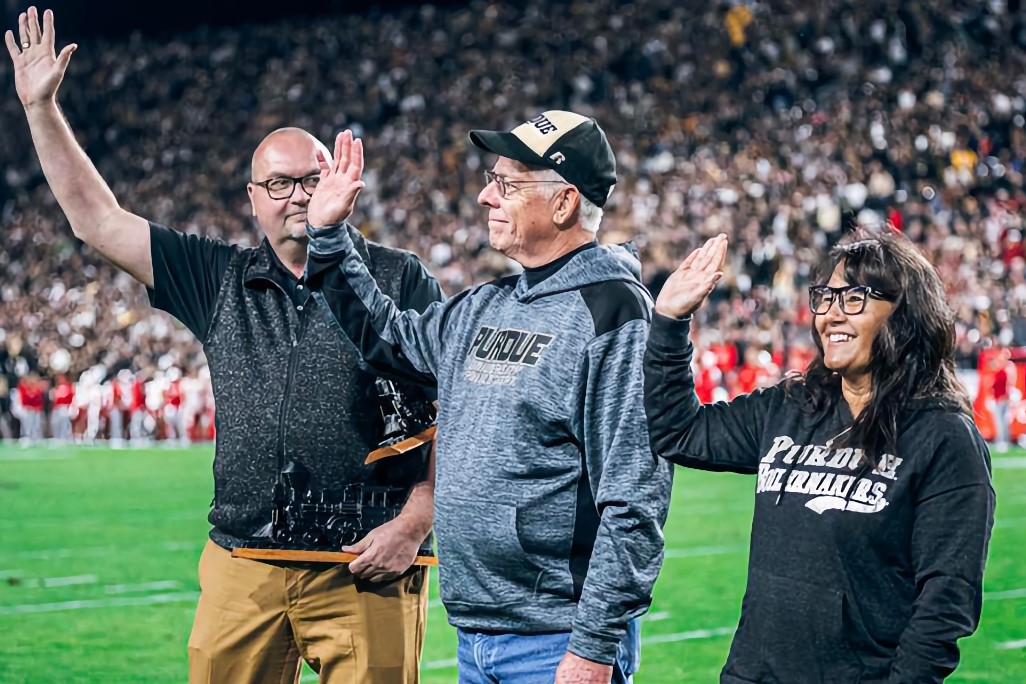
After decades at Purdue University and 20 years shaping the student journey at Purdue Polytechnic, Antonia Munguia, director of the Office of Recruitment and Diversity, will retire on May 30. Her career has been a testament to her dedication, navigating institutional changes and tirelessly working to create a more inclusive and supportive environment for countless students.
For Munguia—or simply Toni/Miss Toni as so many affectionately call her—the recruitment, retention and diversity goals that have defined her role at Purdue Polytechnic over the years haven’t just been about the raw numbers of students in the college. It has also been about the students’ quality of life once they get to Purdue, and giving them a pathway to graduation.
Toni is capable of both nurturing students and providing tough love when it’s needed; it isn’t just that this blend has worked for so many now-graduated Polytechnic students. It is also that the depth of Toni’s focus and her sheer work ethic mean that many students simply never get the chance to slip through the cracks. Toni and her team—in whatever form it has taken over the years—are always there to get people on their feet.
Purdue roots
Toni has a long history at Purdue. “I've actually hit 20 years with the college,” she said. “I started in April of 2004, when it was still the ‘School of Technology.’” And yet, her Purdue story began even earlier. “I have been with the university about 30 years,” Munguia noted, recalling her initial role in the Office of Admissions.
Mitch Warren, Purdue’s associate vice provost for admissions, offered her that first position. “I spoke to him recently, actually. He said, ‘I was in California. I remember calling you,’” Munguia said with a laugh. “I had just applied after I graduated … and it was through that first Office of Admissions job where we broke into some really amazing territories. I traveled to Puerto Rico for recruitment, we went to Florida. It was pretty amazing.”

Toni was herself a nontraditional student at Purdue. She moved to the area from Peoria, Illinois when her husband Ralph (himself a lecturer at Purdue for almost a decade) was transferred to Indiana with Caterpillar. As an adult student, Munguia’s path at Purdue started with a Bachelor’s degree in family studies.
Munguia has seen the college through multiple transformations, including two major name changes—from the School of Technology to the College of Technology, and then to the Purdue Polytechnic Institute.
“So I graduated, I got hired in admissions, and then in 2004 this college under the old School of Technology name hired me as the director of diversity programs,” Toni said. “And you know, the student body had something like 8 to 10 percent women. We had the lowest number of women really across campus.”
Championing new students
Mary Sadowski, at the time an associate dean, was the first person to give Toni a long-term goal to increase representation of women. “I'm proud to say that it looks like about 25 percent of our incoming class is going to be women. That's the highest,” she shared. “It's taken us 20 years, or taken me 20 years to get that.”
Why did representation matter to Toni? In answer, she grabbed a few photo frames from around her partially packed-away office. There is a common feature in many of Toni’s old photos of personal and professional memories; she’s the only person who looks the way she does.
Her own experience gave Toni a sense of how to connect with students who might feel at a disadvantage due to their background or identity, and why it was important to drive a sense of belonging on campus. “If you’re an underrepresented student, things have changed a lot in the years since these photos. Still though, you have to know how to navigate, to be comfortable with the knowledge that you belong here, you know, and to be confident that you’re in the right place.”
“A lot of the kids who come here from majority-minority high schools, for instance, have a much harder time feeling like they’re part of the spirit on campus, if you want to call it that. It is really important that we provide spaces for someone in that position to gain their sense of belonging. Once they get that sense of belonging, feel confident and start excelling, then they can join the whole campus community.”
The art and science of caretaking
Toni has always structured her own work, and the work of her team, in a way that it accounts for the big picture of a student’s experience. “This is what I was always taught even going back to my degree. We're about relationship-building and understanding the whole child,” Munguia said.
A critical part of this, often overlooked by modern recruitment trends, is engaging with parents. “When you are recruiting, you just have to know who their influencers are,” Toni advised a younger colleague. “Sure, you have to recruit the student, but when you recruit a student, you also need to pay attention to the parents.”
Toni cautioned against advice to "forget the parents," saying, "They are one of the heavy hitters in influencing these kids.”
Recruitment isn't just about "selling majors and programs." "It's also a fit, you know? I mean, we have parents who directly ask us, ‘Are they going to take care of my baby?’ … You have to build those relationships. You have to be present for the whole family when they visit and when you talk to them."
This personal touch has left a lasting impression. Munguia recounted a recent interaction at a restaurant when a mother approached her. “She goes, ‘You work at Purdue? … You're the lady who did the videos.’” The family must have watched her videos or attended virtual family chats during the COVID-19 pandemic when seeking reassurance about sending their son to college. “She remembered me, and then she said ‘We’re here because of you!'” Munguia said, still marveling.

An always-open door
Beyond recruitment, Munguia’s office became a haven for students facing challenges. “I never had an official title of ‘ombudsman,’” she said, “but yeah, I was kind of like the student ombudsman. They come and… we’ve had students that don’t feel comfortable telling people almost anything about a bad experience they’ve had. But they'd come and tell me.”
Toni said that navigating difficult situations has meant that her and her team members have had to master the politics of resolving situations diplomatically, but also efficiently. “Sometimes you just have to kick a problem up a level—some amount of escalation might be what you need to solve a problem, if the problem is big enough! But we don’t want to do that unless we have to.”
Regardless of the roadblocks faced by many of the students Toni has helped, her effect on them is plain to see given the piles of letters she's accumulated. There is something almost comical about the letters; a smattering of thank-yous or thinking-of-yous can be found bursting out of almost any drawer, any nook or cranny in Toni’s office. Holding up a letter from one of last year’s graduates, Toni said, “Oh my gosh. I mean, to get a letter like this from a student. … They know that you care and that they can talk to you about anything.”
Toni’s message to students has been consistent for years. Families should know that Polytechnic students don’t get any advice from Toni that she wouldn’t give to her own children, even down to the motto she used with her kids: "Work hard and get smart." Toni got a little emotional thinking about just how many people she’s given that advice to. “No one else will do the work for you, you know? So I’m always trying to teach people how to stand up for themselves, how to do their best.”
Questions of legacy
As she prepares for retirement, Munguia reflected on what it takes to succeed in a role like hers. “You have to be someone who understands people,” Toni said.
“Data is wonderful for certain things, but if you don't know what to do with that data, and if you can't bring it to the individual, you know, it’s that much harder to give someone the resources—or even just the kindness they might need. You need to be a good relationship builder.”
Flexibility and a willingness to help are also key. “Be flexible when somebody walks in your office, ‘Hey, we just have a walk in… Can you take them?’ Yeah, sure. It’s never a problem.”
Toni is reluctant to take credit for her personal contributions to certain efforts—the record enrollment for nearly a decade straight, the diversity of the current student population, etc. She won’t admit that her role requires a certain level of selflessness; ironically if she said “yes,” her ego might be getting in the way, so she simply doesn’t say it.
While her selfless approach may be obvious to the rest of us, Toni just prefers to focus on the outcomes and what they mean for the conditions of students today, and in the future. “I honestly think that things have gotten better, yes,” Munguia said. “I think our students today are more apt to stand up for themselves, more willing to admit that they might need help, and I think they have a better sense of fairness.”
As Toni prepares to make an exit from her long-time role, her feeling is that students can always use more motivation to “work hard and get smart.” And for countless students, Toni has provided the push and pull that they need to do just that. On the eve of Toni’s well-deserved retirement, the whole Purdue community joins Polytechnic students of all backgrounds and life situations to simply say: thank you, Toni, for all you’ve done for us.
